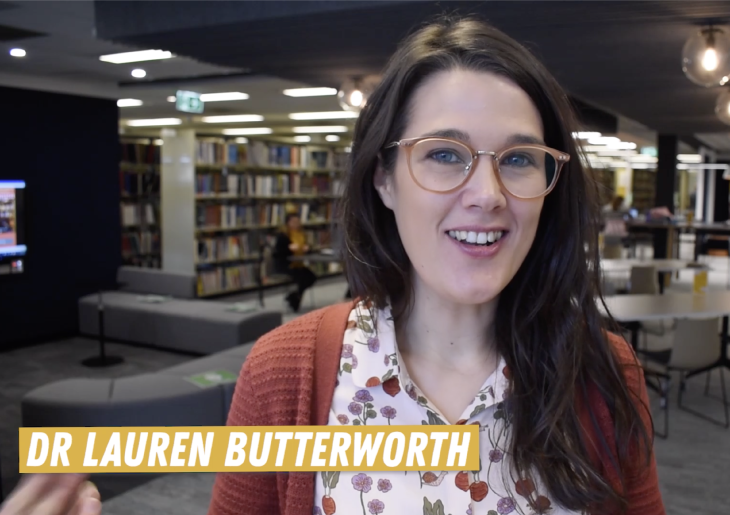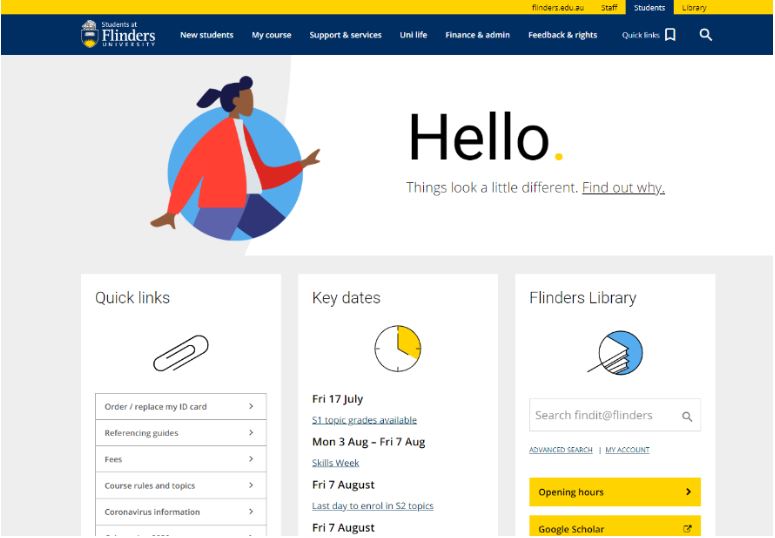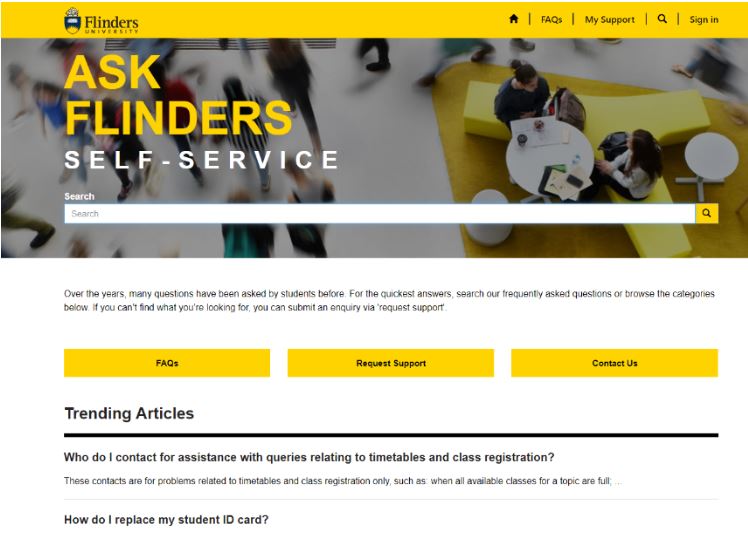
Hi everyone, it’s season two of Like a Boss with me, Dr Lauren Butterworth – if you want my fancy title. I’m an Associate Student Learning Advisor with the Student Learning Support Service and whether you’re joining us as a brand-new student, or returning after the semester break, I would like to welcome you all to this new semester.
It’s wonderful to see so many of you back on campus and if you’re joining us from home, as many of you are, you might have noticed a revamp to our online space with the introduction of the new Student Portal. The new student site is super easy to navigate and it includes everything you need such as a support services directory, links to your systems like OKTA, and information about how to get involved in activities on campus and online.

But before we get too deep into the official stuff, I want to send a special shout-out to the international students who are joining us on–shore for the first–time this year – welcome to wintry Adelaide – and to those of you who are joining us virtually from your homes overseas or in regional areas around Australia, welcome!
For those of you who don’t know, Like a Boss is a series to help you be a better student – whether that’s helping you find your way around Flinders and getting you connected to the services you need, or giving you some top study hacks that will make you more productive, engaged and motivated. I’ll be joined by academics, support staff and students who are experts in areas like productivity, stress, motivation, and time-management. So, subscribe to PING and keep checking Finding Your Way at Flinders to keep up to date!
So, without further ado, let’s talk about my top three strong habits to develop to get semester two started on the right foot!
- Be Proactive
We all know that being at uni means taking a large amount of responsibility for ourselves and our own learning, right? We’re here to foster the skills that will make us independent, capable and able to apply our critical and creative skills to innovate and solve problems. We don’t just magically have these skills by the time we graduate. The process of becoming means there’s necessarily a process of doing, of acting. Being proactive means looking to the horizon to see what’s coming and finding solutions to those problems now. And that means we sometimes have to do things that are out of our comfort zone. Part of making proactiveness a habit means becoming comfortable with that. So, a few ways to become more proactive now:
- Familiarise yourself with FLO. Be thorough and go through your topics noting what the class expectations are, making sure you can access your readings, and knowing what you’ll be assessed on and when.
- Proactive students will also check out the Additional FLO topics! Pages like Library World, the Student Learning Support Service and Horizon. Explore, see what’s available, go down rabbit holes of discovery.
- Be active and engaged in class. Take notes, join class discussions, create a study group, post on FLO discussion boards. Don’t just sit back and expect to be filled with knowledge like you’re an empty vessel and your tutor is the sole font of knowledge. Fill your own cup!

- When a problem arises, try to give solving it a go on your own, even if it’s just for fifteen minutes. Sometimes when students see me in the Learning Lounge, I don’t know the answer either and so we Google it together. You know what? You can Google things on your own!
- And, if you really want to start getting proactive, spend some time reflecting on why you’re here. If you can zero in on this, it will give you a better idea of where to put your energy and what kinds of opportunities to look out for and jump on. For example:
- Are you here to get a good job? Have a look at what Careers are doing. Go to some workshops or check out the Horizon program.
- Are you here for the love of learning? Chat to the library or come and see the Student Learning Support Service and make sure you have the tools you need to dive deep into your topics and succeed.
- Are you here to make some friends and have fun? Check out what FUSA’s up to. Join a club or a society.
- Get organised
This habit is really a more specific off-shoot of being proactive. If you don’t want to be the student who’s constantly leavings things till the last minute, then you need to think and plan ahead. Pretty simple, right? If you’re anything like me, you probably start out with good intentions that very quickly fall apart. But, there are lots of little habits that we can incorporate into our day to day lives to help us stay on top of things.

- Find a time management system that works for you. This might mean picking up a FUSA diary and semester planner, or it might mean setting up your Outlook or Google calendar.
- Go through FLO and your Topic Handbook and note down your important dates: major assessment, in-class tasks, and when your readings are due.
- Create notifications to help you get in the habit of checking these dates regularly. I use Outlook calendar notifications, but there are other programs you can use like Pocket Schedule Planner which lets you add your class times, assignment due dates and notifies you when things are due.
- Make use of the resources at Flinders like the Student Learning Support Services new modules and check these regularly! In particular, I recommend Due Date Tactics and Maximise Your Time for some tips to get you started with time management.
- Ask Questions
This is another off-shoot of being proactive – getting into the habit of asking questions. You’ve tried to solve a problem yourself, but have become stuck? Well, don’t just sit there feeling bad about it. Ask someone! I get why it’s hard, I used to hate asking questions. I was afraid I might look stupid, or reveal myself as an imposter, or that I might waste somebody’s time. But you know what? This is a university! The whole point of being here is to learn and share knowledge. Your questions are valid, whether they be ‘where’s my class’, or ‘what’s the air-speed velocity of an unladen swallow’, or ‘how do I get Cell-o Park to work.’ (seriously, how does Cell-o Park work?). Plus, if you’ve done the work first and tried to find your own solution, then when you do ask those questions they’re going to be specific, solution-based and you’ll show whoever you’re speaking to that you’ve already done some of the work.

- Question about your topics?
- First, check FLO to see if there’s a discussion forum about it, or if your topic coordinator has specified their preferred contact method.
- You should always be able to ask your tutor or your topic coordinator a question. If you can’t, go to FUSA!
- Questions about enrolment?
- That’s what Flinders Connect is there for! Whether it’s in person, online or on the phone, there will be someone who can help guide you through questions about enrolment and your timetable
- Questions about FLO?
- The library help desk is the place to go. You can jump online, see them at the library helpdesk, or you can give them a ring.
- Questions about academic writing, referencing or maths?
- Check out the Student Learning Support Service
- You can see us via a one-on-one appointment either face to face or online. You can drop into one of our workshops up in the library commons, down at Sturt or on Collaborate, or you can access our resources on FLO.
- Questions about literally anything else?
- Ask Flinders! They’ll hook you up with wherever you need to go!
That’s all for this week! I hope you are all settling into this new semester well. Next time, I’ll be chatting to some academics about what they wish they knew when they first started university. In the meantime, you can catch up on Season 1 of Like a Boss at PING, where you can also subscribe to keep up with new episodes as they arrive! See you all soon 😊

The point is, there are people here to answer you and to give you the information you need. Don’t be afraid to speak up! Chances are, if you have a question, someone else is sitting next to you wondering the exact same thing!

